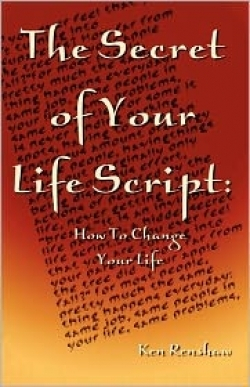It looks like you've stumbled upon a page meant to be read by our code instead of viewed directly. You're probably looking for this page.
The Secret of Your Life Script
How to Change Your Life
“Memes,” or “units of cultural ideas,” are passed on to children by their parents, and form the basis of one’s “family script,” according to author Ken Renshaw. As a child grows and ventures out into the larger world, teachers, peers, religious leaders, and the culture at large all contribute more memes to the child’s life script. Carried in the individual’s unconscious mind, memes will shape behavior and be used, unknowingly, to chart the course of the individual’s life. Although this process may facilitate the child’s “fitting in” to the family of origin and the larger social structure, following a life script written by others almost certainly guarantees that the child will never rise to his or her full potential.
Renshaw focuses on the Greek myth of Sisyphus, who was condemned by the god Zeus to an eternity of pushing a heavy stone up to the top of a mountain, only to have it roll back to the bottom each time. Sisyphus, according to Renshaw, was actually under a spell that had been cast by Zeus that made him believe that it was necessary for him to engage in this repetitive and futile behavior. Indeed, Renshaw makes a convincing case that many people are under the same spell as the unfortunate Sisyphus: they are programmed to play the game of life to lose. Fortunately, Renshaw offers hope that by examining and dealing with the memes that keep one under such a spell, one can take back power and change one’s life for the better. What’s more, Renshaw affirms that this can be done without the aid of a therapist, unless the process creates severe emotional distress.
Renshaw helps readers liberate themselves from enslavement to hidden memes and create their own personal life script through a technique that he calls the “Rosetta Stone.” The method involves comparing one’s own life story to that of one’s parents by looking at incidents that have occurred as though they were scenes in a movie. The act of creating these movie scenes, or “storyboards,” allows one distance and perspective, and even those who believe that they are nothing like their parents often come to see the similar threads that run through outwardly dissimilar circumstances. Renshaw argues that creating such storyboards will help readers to understand and utilize this valuable technique.
Although the author’s approach is entertaining and non-threatening, it is suggested that a more scholarly writing style would better reflect the significance of his thought. While his conversational tone and the inclusion of entertaining stories may make his concepts accessible to readers without much background in the field, it is not likely to appeal to highly educated readers or professional therapists. Editing and proofreading by qualified professionals would have eliminated errors of grammar, usage, and fact, as in the author’s referring to Rhett Butler, a character in Gone with the Wind, as “Brett.”
That being said, Renshaw, who was chief scientist and marketing manager for a Fortune 500 company (manufacturing and selling commercial satellites to national and international broadcast TV and telephone services companies), has made a valuable contribution to the understanding of the subtle mechanisms that keep people stuck in repetitive, meaningless, and unfulfilling patterns of behavior. Secret of Your Life Script offers hope and practical suggestions that can lead to freedom.
Reviewed by
Kristine Morris
Disclosure: This article is not an endorsement, but a review. The publisher of this book provided free copies of the book and paid a small fee to have their book reviewed by a professional reviewer. Foreword Reviews and Clarion Reviews make no guarantee that the publisher will receive a positive review. Foreword Magazine, Inc. is disclosing this in accordance with the Federal Trade Commission’s 16 CFR, Part 255.
